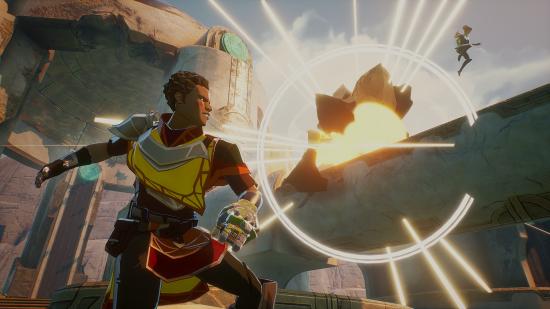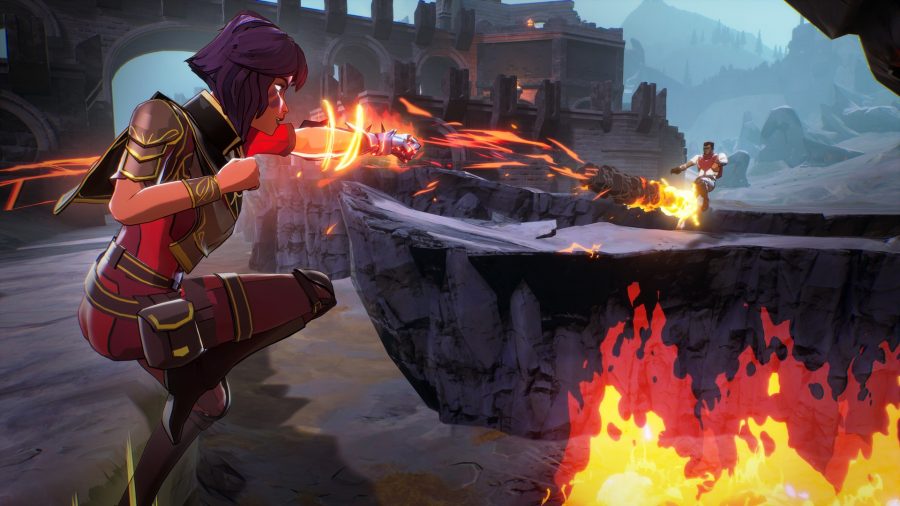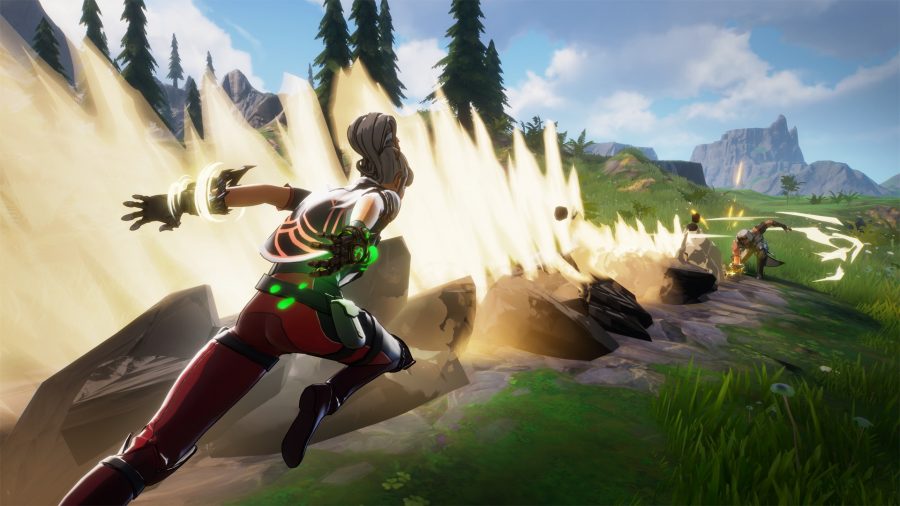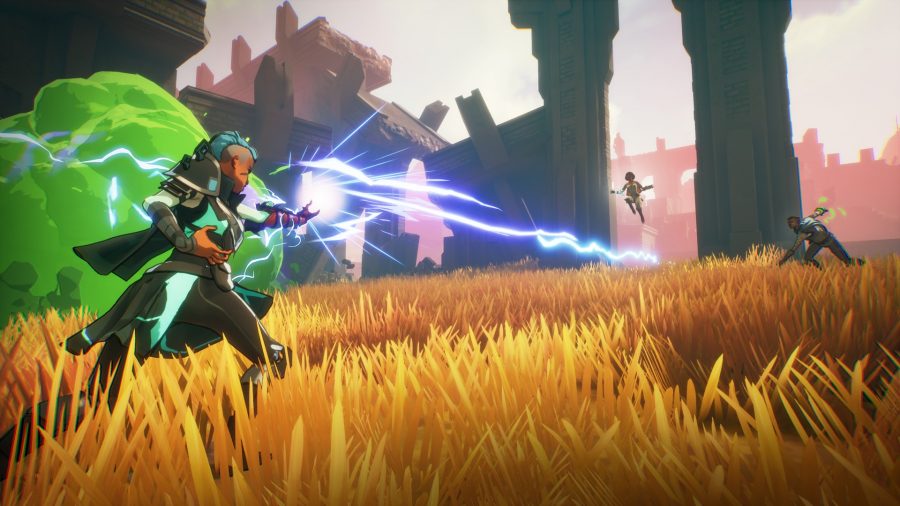Ranked modes can be contentious things, and developers that choose to add one into their games often have to work for months on end to make it fair and enjoyable. However, despite an enormous amount of work in this department, developers struggle to keep their entire playerbase happy.
From unsatisfying rewards to dubious matchmaking, almost every ranked mode has come under fire from their respective community in one way or another. While they offer a great arena for competitive-minded players, they’re hard to get right. The latest game trying to nail the formula is Spellbreak, the third-person, spell-casting tactical shooter and battle royale. While the game itself has fostered a relatively small but passionate playerbase since full release in September last year, its upcoming ranked mode, Leagues, looks to be remarkably sophisticated.
Leagues will give Spellbreak players a competitive environment to prove themselves, with six Leagues that each have ten tiers within them – that’s 60 tiers to climb overall. Couple that with one of the most transparent scoring systems we’ve seen in a ranked mode, and Leagues looks to be an exciting prospect.
In an intriguing twist, Spellbreak’s ranked mode will also attempt to be a tutorial and onboarding tool for new players. While most games force new players to learn the skills they need into casual modes, developer Proletariat wants new Spellbreak players to learn on the job. The scaling scoring system also awards Crowns (the game’s currency for ranking up) for different in-game activities, depending on your rank. Something as simple as killing an NPC may award you Crowns in Bronze, but not in the higher divisions.
Spellbreak’s ranked mode will be unleashed upon its players on April 8 with its Chapter 2 update. Ahead of its release, The Loadout got the chance to pick the brains of Proletariat’s design director and co-founder, Jesse Kurlancheek, and Spellbreak’s producer, Jennie Hsu.
The Loadout: Tell us a bit about how Leagues came to be. Was it something Proletariat wanted from the very start, or a community-requested feature?
Jesse Kurlancheek: So we launched Spellbreak [in its first testing phase] almost three years ago at this point. And very early on, we had leaderboards because it was a very simple thing we could put in for players to rank themselves against each other.
However, we took them out a few months into the test, as they were causing some really warped behaviour that we didn’t want to encourage. So since then players have been wanting to compete against each other to rank themselves.
We’ve got a fairly vibrant external competitive community who do their own tournaments and such, but we had never really done anything official in game. And they’d always been clamouring for some way for the game to say [they are better than one another]. Players really wanted the feature, and we agreed.
So aside from keeping existing players happy, what’s the importance of having a ranked mode in a game like Spellbreak?
JK: I think there’s a lot of people that see a competitive game and if it doesn’t have a ranked system, or some way of sort of progressing in that space, they look at it a little bit askance. So it certainly helps in that regard. And I think a lot of the decisions we made lean towards onboarding players that may not be as familiar with the game or may not be as skilled. [We want] to give them a path of mastery and progression, and I think that is very valuable for them.
Jennie Hsu: It’s also worth pointing out we had been in early alpha and beta stages for three years before we even launched. And the reason that we had that so early is that as a studio we’ve really always prided ourselves on listening to our community. We’ve been active on Twitch and on Discord throughout all of that. But we don’t just choose features to pursue simply because the community asks for them – if we don’t think it’s good for the game, we’re not going to do it. But it is much more of an organic, give-and-take sort of approach to development.
Did elements of ranked modes in any other particular games influence or inspire Leagues?
JK: I don’t think Leagues is a one-to-one with any particular game. In my younger days, I was very serious about competitive games. I was top-tier. But things, since then, have changed pretty dramatically. The competitive communities back in those days were small – it was only the hardest of the core that would play competitively.
Now though, most of a playerbase will embrace competitive play. My wife plays competitive in League of Legends, for example, I’ve got friends that dabble in competitive CS:GO, or Apex Legends, or Hearthstone, but they’re not necessarily what you’d describe as a competitive gamer.
Also, when you look across all the different games, they all have different restrictions, they all have different systems – Is it 1v1? Is it team-based? Is it battle royale? Is it objective-based? All of those things sort of filter into what, what you want to do. You really have to tailor things to the game we have and the audience we have. So while we certainly looked at both the best [games] in class, we also looked at things that didn’t work out for their communities and tried to incorporate things that would only work well for Spellbreak.
While some ranked modes are either very simplistic or very secretive about what you’re ranking up for, Leagues really isn’t. You get a full breakdown of every single thing you earned or lost Crowns for. Why was it important to have a really transparent scoring system?
JK: I think for our first foray into ranked we wanted to make it as explicit and transparent as possible. If you are playing ranked, here’s your current standing, here’s what you’re going to gain, here’s what you’re going to lose. And also, here’s how to gain those points again.
I think one thing that will quickly crop up after launch is that players will make a compendium of how many points you get for doing specific things in this League versus how many points in this League or whatever, and there’s a little concern there that you don’t want to incentivise strange behaviours in-game. So all of our accolades are generally around doing good stuff, and they become more narrowly defined as you rank up.
So at the start, you might get Crowns for looting things, or resurrecting your teammates. But, as you climb higher up the Leagues, it’s more about: Are you doing damage? Are you taking players out? Are you capping points? Are you winning?
On that topic, you appear to be using ranked as an actual tool to educate new players. This is a pretty interesting approach, so can you explain the thought process behind that?
JK: So one of the tenets of the Leagues system, in addition to providing something for competitive players, is also to onboard newer players. So, if you’re brand new to the game, or you’ve just decided to try ranked out for the first time, chances are you’re not going to be the best at the game. And so giving you onboarding tasks, like killing NPCs, or getting good gear is really important. If the game is only going to reward you for getting kills or capping points or winning matches, even in a fair matchmaking situation, chances are, you’re not going to manage a lot of them.
We don’t want to roll out a feature that’s only going to appeal to the top 20% of our audience. I don’t think anybody’s happy in that world.
Some ranked modes actively prevent high-ranked players squadding up with low-ranked friends. You’ve opted for the alternative, which is to take an average of a squad’s skill and use that for matchmaking. Why did you choose that route?
JH: One of the things that we really wanted to establish with Spellbreak is that we really want people to be playing with their friends. It’s why we released with full cross-play. And so especially because we’re going to be launching Leagues alongside a new game mode, Dominion, I think it’s a great opportunity for folks to get newer players into the game.
JK: Also, [the squad’s average skill] is not a strict average, we actually do give more weight to the higher League players. So if I have three Bronzes and two Platinum players, those two Platinum players will drag the Bronzes up further than they would drag the better players down. So you might end up playing against Gold players or something like that.
In higher Leagues, it’s actually possible for a player to lose Crowns and drop rankings for a poor performance, even if their team wins a match. Why put the focus on performance rather than results?
JK: The first thing is that the Leagues system is pretty flexible in terms of what types of game modes it can work with. So by getting Crowns for those individual accolades, we can make Leagues [compatible with] any game mode that we come out with. If in the future, we had a game mode that didn’t necessarily have a set winner and a loser like in Dominion, like battle royale for example where placements matter, it’s not great to award a lot of Crowns for winning.
You’ll also see in other competitive games, people will say: ‘Oh, we had a really good game, we synergised really well, we took the objectives, we did a lot of damage, but we lost points because we didn’t win’, that doesn’t feel great. The flip side is, if my team is hard carrying me and I’m inting or AFK for half a match, me getting a reward for that also feels a little bit skewed. So, by taking in those other factors, I think it really helps.
JH: I think it’s also important because we have six different elements, we have a whole talent system, and Spellbreak was never really designed to have one single meta that you run so you can win. So I think by [awarding players based on performance], we’re really encouraging players to play with their preferred loadout.
You mentioned AFKing and general negative behaviour just then – is there a direct punishment system in Leagues for troublesome players?
JK: There’s no direct punishment, no. If I’m feeding, sure my teammates will probably report me, but the game is not going to say: ‘Oh, you’ve had 20 deaths and haven’t done any damage, you know, we’ll we’ll do something about that.’
In terms of leaving games, you will not get any Crowns, but the cost to enter that game will still be deducted. So there’s soft disincentives, especially as you rise through the ranks, but no there’s no system-driven punishments or anything like that.
What are your immediate plans for Leagues after it launches?
JK: So there’s a couple of things. First, all of the metrics and player feedback will be gathered and we might adjust aspects like the amount of Crowns for a given accolade for example. The first week, it’s really hard to do balancing on a system like this, so we’ll be watching that and seeing [what happens].
There are also some things I can’t talk too much about right now, but we do have a couple of things on the roadmap that are fairly concrete. So we don’t have custom matches at launch for Dominion and we’ll [be looking at that].
Another feature that players have already expressed a great deal of interest in is giving them a hard ladder of the top 500 players in the world or something like that.



